| Srl | Item |
| 1 |
ID:
111139
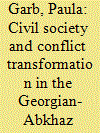

|
|
|
|
|
| Publication |
2012.
|
| Summary/Abstract |
Since the August 2008 war, citizens engaged in Georgian-Abkhaz conflict transformation projects have maintained their resolve to keep open channels of communication across the conflict and continue strengthening fire-proof defenses against violence. These defenses are still fragile, and face challenges from internal and external forces analyzed in this article. This article presents analysis of (1) civil society in Georgian and Abkhaz communities and its role in conflict transformation in the years leading up to the August war of 2008; (2) responses by Georgian and Abkhaz civil society leaders and outside facilitators to events in the months before and during the August war of 2008; and (3) civil society's role in conflict transformation since the August war of 2008 until 2011.
|
|
|
|
|
|
|
|
|
|
|
|
|
|
|
|
| 2 |
ID:
111138
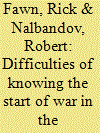

|
|
|
|
|
| Publication |
2012.
|
| Summary/Abstract |
The August War in 2008 generated incompatible accounts of the events causing its outbreak. Through an analysis of Russian language, Georgian language and major English print media, web and television sources, this article provides analysis of the empirical obstacles to objective knowledge; determines what we know, and what remains unknown, and demonstrating what is contested. It then shows the difficulties of being certain of the causes of war, the divergent terms and justifications used, and contends that the start of the war should not be treated as a single event. Rather, the start of the conflict must be understood in terms of an interlinking cycle of events.
|
|
|
|
|
|
|
|
|
|
|
|
|
|
|
|
| 3 |
ID:
111136
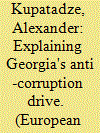

|
|
|
|
|
| Publication |
2012.
|
| Summary/Abstract |
This article explains Georgia's achievements against rampant corruption that plagued the country for decades. It demonstrates how Georgia has moved from being a 'failed state' to the state with low corruption rates following the Rose Revolution of 2003. It is argued that several internal and external drivers motivated Georgian leadership to fight corruption in the post-revolutionary setting, including drawing legitimacy from anti-corruption campaign and using it for political purposes, 'the West' as allure and desire to drift away from Russian trajectory of development.
|
|
|
|
|
|
|
|
|
|
|
|
|
|
|
|
| 4 |
ID:
111134
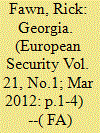

|
|
|
|
|
| Publication |
2012.
|
| Summary/Abstract |
This article places new works in the context of the major implications arising from Georgia's Rose Revolution and the war of August 2008 for both Georgia and the wider Euro-Atlantic area.
|
|
|
|
|
|
|
|
|
|
|
|
|
|
|
|
| 5 |
ID:
111137


|
|
|
|
|
| Publication |
2012.
|
| Summary/Abstract |
Since the Rose Revolution of 2003, the Georgian Government has made criminal justice reform a cornerstone of its political agenda. A big part of this was the fight against organised crime. This article looks at the use of anti-mafia policies and police reform to create domestic security in the post-revolutionary period. This article provides an account of collusion between the state and organised crime actors known as thieves-in-law prior to the revolution and levels of victimisation and insecurity amongst ordinary Georgians in this context. This article then details the anti-mafia policy and the criminological situation in Georgia since the Rose Revolution. It argues that Georgia has witnessed a huge crime decline and increases in security. In conclusion, this article suggests that the Georgian Government now 'governs through crime' and that this model might emerge in other countries of the post-Soviet region.
|
|
|
|
|
|
|
|
|
|
|
|
|
|
|
|
| 6 |
ID:
111135
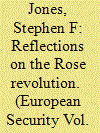

|
|
|
|
|
| Publication |
2012.
|
| Summary/Abstract |
This article focuses on the paradoxes inherent in the Rose Revolution in Georgia. The Rose Revolution and its colored companions precipitated two disappointing reactions in the former Soviet space: first, disillusion with popular democracy movements, and second, what Vitali Silitsky calls 'preemptive authoritarianism', or the ability of post-Soviet regimes to anticipate popular challenge. I connect the ideology and style of the Rose Revolution with the constitutional crisis of November 2007 in Georgia, and with the Russo-Georgian war of August 2008.
|
|
|
|
|
|
|
|
|
|
|
|
|
|
|
|
| 7 |
ID:
111140


|
|
|
|
|
| Publication |
2012.
|
| Summary/Abstract |
The brief war between Georgia and Russia in August 2008 provoked vigorous international reactions among the European states as consequence of the sudden shift in the strategic balance. This article argues for a focus on the great powers France, Germany and Britain as crucial actors for understanding the policy reactions towards Russia. It argues furthermore that reactions must be explained from the perspective of experience based on past geopolitics which translate the external pressures into concrete foreign policy: France oriented towards the creation of a strong EU as global actor, Germany influenced by her self-imposed restraint in foreign affairs and Britain influenced by Atlanticist commitments in her balancing behaviour. Beyond the Russo-Georgian war, the article points to an interest-based foreign policy approach towards Russia in the longer term driven by a great power concert with the Franco-German axis as stable element but increasingly with backing from Britain, thus contributing to transatlantic foreign policy convergence on the issue.
|
|
|
|
|
|
|
|
|
|
|
|
|
|
|
|
| 8 |
ID:
111141


|
|
|
|
|
| Publication |
2012.
|
| Summary/Abstract |
The stand-off over the breakaway territories of Abkhazia and South Ossetia has been turned into an embittered deadlock after the war of August 2008. This article assesses how Georgia continues to live after this most dangerous moment in its modern history. In some ways, the country has survived and developed. The future indeed remains open, but it is full of uncertainties.
|
|
|
|
|
|
|
|
|
|
|
|
|
|
|
|